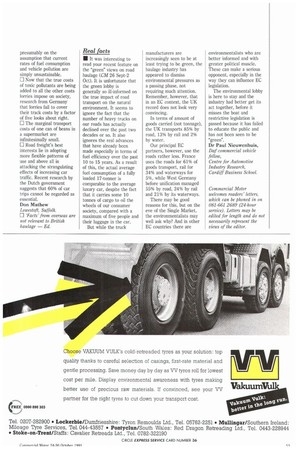Real facts
Page 55

If you've noticed an error in this article please click here to report it so we can fix it.
II It was interesting to read your recent feature on the "green" views on road haulage (CM 26 Sept-2 Oct). It is unfortunate that the green lobby is generally so ill-informed on the true impact of road transport on the natural environment. It seems to ignore the fact that the number of heavy trucks on our roads has actually declined over the past two decades or so. It also ignores the real advances that have already been made especially in terms of fuel efficiency over the past 10 to 15 years. As a result of this, the actual average fuel consumption of a fully loaded 17-tonner is comparable to the average luxury car, despite the fact that it carries some 10 tonnes of cargo to oil the wheels of our consumer society, compared with a maximum of five people and their luggage in the car.
But while the truck manufacturers are increasingly seen to be at least trying to be green, the haulage industry has appeared to dismiss environmental pressures as a passing phase, not requiring much attention. Remember, however, that in an EC context, the UK record does not look very convincing.
In terms of amount of goods carried (not tonnage), the UK transports 85% by road, 13% by rail and 2% by water.
Our principal EC partners, however, use the roads rather less. France uses the roads for 61% of goods transport, rail for 34% and waterways for 5%, while West Germany before unification managed 55% by road, 24% by rail and 21% by its waterways.
There may be good reasons for this, but on the eve of the Single Market, the environmentalists may well ask why? And in other EC countries there are environmentalists who are better informed and with greater political muscle. These can make a serious opponent, especially in the way they can influence EC legislation.
The environmental lobby is here to stay and the industry had better get its act together, before it misses the boat and restrictive legislation is passed because it has failed to educate the public and
has not been seen to be "green".
Dr Paul Nieuwenhuis, Daf commercial vehicle fellow, Centre for Automotive Industry Research, Cardiff Business School.




























































































